Saving Savoeun
In the United States, an Amber Alert is broadcast when a child goes missing. But how to create an Amber Alert in Cambodian villages when the enemies are sex traffickers? World Vision came up with a plan.
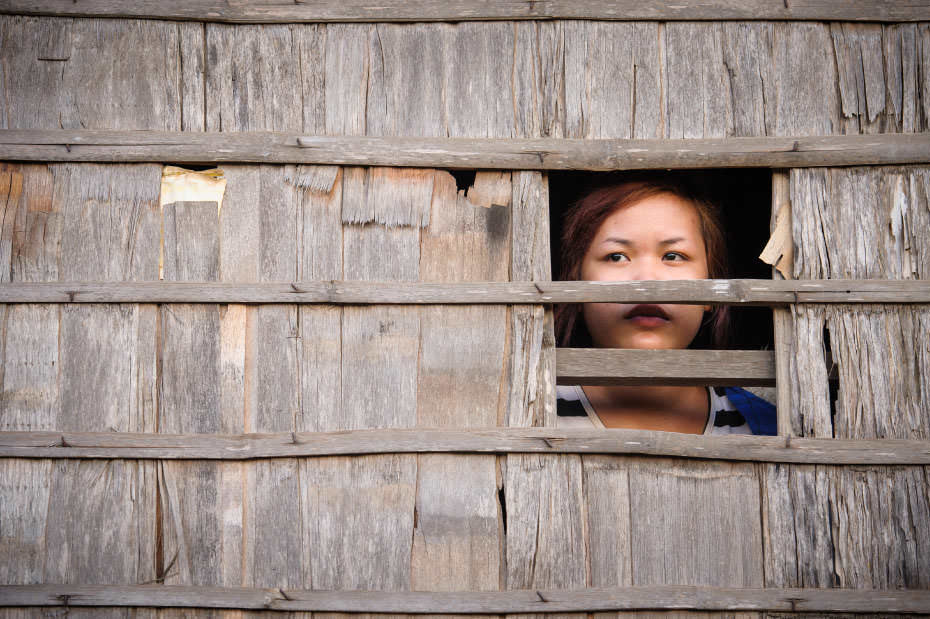
One warm Wednesday in June, 15-year-old Savoeun Chea went to work in Leuk Daek in southeastern Cambodia. Leuk Daek is a place of rice fields and rivers, its scenery strewn with ornate pagodas that bespeak the country’s Buddhist heritage.
Savoeun quit school to work at the sewing factory when she was 12. Back then, she rode a bicycle to work. But on this day, the teenager took a motortaxi, her hands clutching a small bag containing the items she had been instructed to bring: her clothes and her older sister’s birth certificate.
At the factory that morning, Savoeun’s sister Simean was the first to notice.
“I did not see her working,” says Simean, 21. “I asked where she was. People told me that she’d gone to work in Malaysia. I called my family.”
In making that call, Simean set in motion a Cambodian-style Amber Alert. Savoeun’s family, friends, local officials, co-workers, the police, community members, and the children of two villages joined in a singular task: bringing Savoeun home — alive.
Launching a Rescue
When Savoeun’s mother got the call from her oldest daughter at the factory, she and her brother hastened to the inform Chrin Voeurn, 56, the village commune chief, or mayor, that Savoeun had disappeared.
“They looked like they were very afraid,” says Chrin, recalling how Savoeun’s mother and uncle arrived at his office on that June day in 2010. “They told me the daughter went to work as usual but she’d brought a case with a plastic bag. There was something inside it, maybe clothes.”
Savoeun’s mother panicked and paced. “Sometimes she sat. Sometimes she stood,” says Chrin. The mayor acted quickly, picking up the phone and calling Sarom Ye, the commune chief in Prek Dach, where the sewing factory is located. “I knew that if we didn’t intervene in time, we would lose her,” says Chrin.
Sarom Ye immediately called the police. With each passing minute, everyone knew that Savoeun’s vulnerability intensified. Everyone remembered with fear how a similar story in the village had ended.
“I knew that if we didn’t intervene in time, we would lose her.”
— Chrin Voeurn, Mayor
Savoeun in Distress
Savoeun had become entranced with a woman at the factory named Srey Pich. Srey Pich was a newcomer who took a job at the sewing factory and took a shine to Savoeun. The two would sit together and talk, often retreating to a quiet place in the factory. Srey Pich was not a pretty woman. She had one big eye and small eye. She was nasty to her co-workers and to her husband — to everyone, in fact, but Savoeun. She told Savoeun she loved her.
“I heard she was a prostitute,” says Savoeun’s sister Simean. But what no one realized was that Srey Pich was something far more dangerous — a broker who seduced young girls with lies about promising jobs and then sold them into the sex trade or child labor.
Srey Pich had convinced Savoeun to come with her to Cambodia’s capital, Phnom Penh. From there, Savoeun was told she would fly to Malaysia to work as a caregiver. Her monthly salary would increase from $55 per month to $200, money Savoeun could send back home every month to help her family.
“We are poor,” says her mother. “Savoeun sees with her eyes our trouble. She has to try for us.” Savoeun’s mother was sad when her daughter dropped out of school at 12 to work. “She said to me, ‘Why should I study when you are so poor?’” Savoeun’s mother had no answer.
Cambodia’s Suffering
Poverty flows as wide and strong as the Mekong through Cambodia. Eight of 10 Cambodians live in rural areas such as Leuk Daek. More than a quarter of the population lives below the absolute poverty line, making less than $1.25 a day.
Still fresh is Pol Pot’s reign of terror that began in 1975, which the Khmer Rouge dictator declared Year Zero. Pol Pot abolished national currency, seized private property, and drove hundreds of thousands of people from Phnom Penh into the countryside to work as peasant farmers. From 1975 until 1979, around 2 million Cambodians were systematically executed or succumbed to disease.
World Vision started work in Cambodia in 1970 but was forced out during the Pol Pot regime. Only three of 270 World Vision’s Cambodian staff survived the genocide. After the war, World Vision was allowed to re-enter the country, bringing back health care and building up communities through child sponsorship and development programs.
In Phnom Penh, World Vision established care centers for street children and aftercare for girls rescued from the sex trade. The Neaver Thmey (New Ship) center has served more than 800 girls since 1997.
Today, there are 34,500 commercial sex workers in Cambodia. And while World Vision is committed to restoring those who are able to escape, JoJo Pastores, who manages World Vision’s child protection programs in Cambodia, says, “We need to stop child trafficking where it starts — at the village level.”
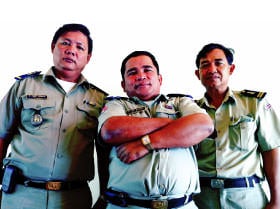
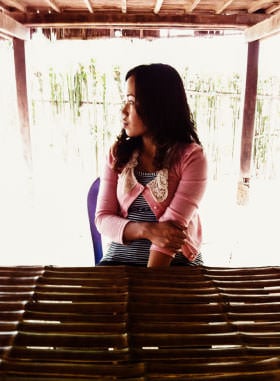
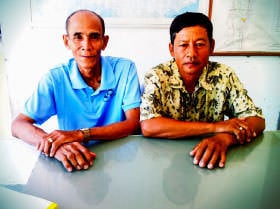
It took a village to save a child. Playing a role in Savoen's rescue were Leuk Daek’s police force, top; Savoeun’s sister, Simean, middle; and commune chiefs Sarom Ye, sitting to the left of commune chief Chrin Voeurn, bottom.
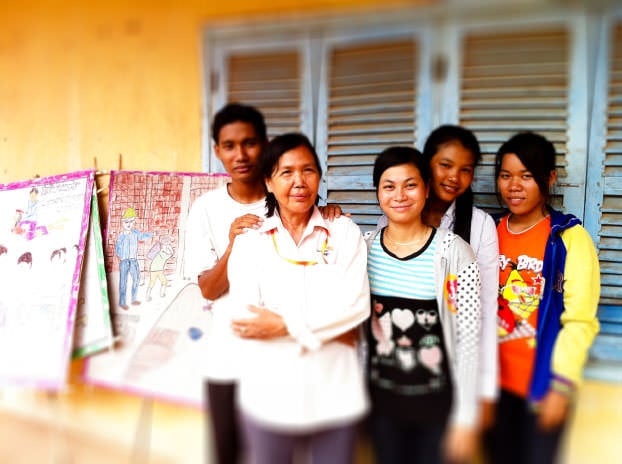
The remarkable Ming Chan with some of the children who lead the youth clubs and comforted Savoeun’s family when she went missing.
Sponsor a child today »Ming Chan’s Children
A girl had been taken before in Leuk Daek. “This case happened before [I started,]” says Louy Samnang, 41, who joined Leuk Daek’s police force in 1999. The girl was raped and killed. Community members admit no action was taken because back then, no one knew what to do.
In those days, deep mistrust lingered in rural areas Pol Pot had turned into the “killing fields.” Not even the children could trust. It was amid such turmoil in 2003 that a remarkable woman started with World Vision as a community development worker in Leuk Daek. At that time, sponsorship was just ramping up. Today U.S. donors sponsor 2,500 children in the community.
“Because of poverty,” Sokchan Keng says, “people did not want to listen to me. Parents would not let their children go to school. Children were without hope.”
“They did not care about the future,” says Sokchan Keng, 52, whom the community calls Ming Chan, meaning Auntie Chan. “They had no goals.” Pol Pot had left desolation in his wake.
“But war is just one reason,” says Ming Chan. “The other reason is knowledge. The children did not know their rights. They did as their families did. And our society did not care much about the children.”
Ming Chan understands with heartbreak why families disintegrated in her country. She was 15 in April 1975 when her family was shepherded by Pol Pot’s troops from Phnom Penh to a province surrounded by water. “We worked in the fields most of the time,” she says. “Whenever we wanted to take a rest and the group leader saw us, they would hit us or kill us, just for taking a rest.”
She still weeps when she describes how her family members died, one by one — her father from diarrhea and her older siblings were executed. “After the war, I became the oldest child,” she says. “I had to take care of my younger brother and sister.” Ming Chan has never married.
In 2003, Ming Chan began her assessments, traveling from village to village. The children were hungry. Some were naked. Few went to school. “When I reached a village, the children would approach me and ask for some cake or something to eat,” she says. “I bought them cakes.”
Their parents began to notice how Ming Chan cared for their children. “I used to tell them that we would not be poor forever,” she says.
But first she had to help the community overcome its poverty of spirit. Ming Chan started with the children, developing clubs for children and teenagers in 2006. The next year she began to teach from World Vision’s Peace Road curriculum. Peace Road taught what had been unthinkable — that children had value and should be protected; that beatings were wrong and that education was crucial, even for girls.
“Before [World Vision came to Leuk Daek] the girls would just stay at home to help around the house,” says Mayor Sarom Ye.
Today 600 children and youth have gone through the curriculum in World Vision’s children’s clubs. “God has given me a lot of children,” says Ming Chan.
The clubs raise awareness as well. “The youth club uses banners to educate the community,” says Sarom Ye, “like for example, for parents [to stop] using their children to earn money and to work.”
World Vision has also worked with law enforcement, holding seminars across Cambodia in which FBI-trained personnel teach local police how to prevent child trafficking. Efforts extend to Phnom Penh where World Vision partners with a network of impassioned non-governmental organizations, taking the message to the highest levels of government: In Cambodia, child trafficking will not be tolerated.
When Savoeun disappeared, the community sprang into action. And this time, it worked.
“Every day I dream that my children will have good things in life.”
— Savoeun’s mother
Savoeun is Saved
Mayor Chrin provides one reason Savoeun survived: “Our commune has World Vision.” Because of the groundwork set in place by World Vision, Savoeun’s sister knew to raise the alarm. Her mother knew to go immediately to Mayor Chrin. Mayor Chrin knew to connect with other officials such as Sarom Ye who engaged the police. Savoeun’s uncle had attended a World Vision workshop on child trafficking and rape. He knew trafficking put Savoeun’s very soul at risk. He rushed to the factory, found Srey Pich’s husband, and plied him with rice wine. Trained police came to assist in the interrogation. By noon, they had Srey Pich’s cell phone number.
“I called 100 times,” says Uncle Ling Thoeun, 36. Finally, Srey Pich called him back. “I was angry,” he says. “I said, ‘Where did you take my niece? Did you tell anyone? Any adult? You are not a human,’” he yelled. “‘You are taking a child from her family’s house.’”
Now in Phnom Penh with Savoeun, Srey Pich told Uncle Ling that she was about to put the girl on an airplane to Malaysia.
And Savoeun was now frightened.
On the way to Phnom Penh, Savoeun had watched Srey Pich hug a policeman. “She hugged so openly,” says Savoeun. “We do not do that. He was not her husband.” Savoeun knew something was amiss.
Srey Pich took Savoeun to a big house with a high, locked gate. “I was afraid,” she said. “I saw many women there. Many of the women had short hair and red clothes.” Savoeun was forced to take a blood test. “Srey Pich told us we needed to have blood tests because they wanted to know if we had a disease.” But noticing that the woman who did the test wore plain clothes rather than a medical uniform, Savoeun felt dread.
The broker then took Savoeun by motorbike to a parking lot near a local hospital. “She told me to stay there and that she would find me something good to eat,” says Savoeun. Srey Pich disappeared into the night. And that’s when Savoeun remembered something in her small bag of belongings. She’d stashed away 10,000 Cambodian riel, or about $2, just enough to make the phone call to her uncle that would save her.
Her uncle arrived quickly with police and Savoeun’s mother. “When I saw Savoeun,” says her mother, “I was not allowed to leave the car. They thought the trafficker might kill me.”
Savoeun’s uncle thrust his niece into the car and bolted from the parking lot. Savoeun was safe, but she appeared drugged. “She sat silent and calm like a chicken with a sickness,” he says. “I tried to talk to her, but she could not respond. We immediately came home.”
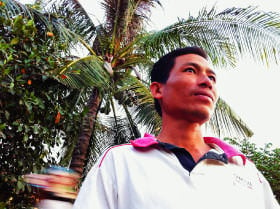
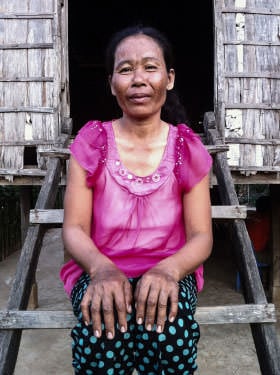
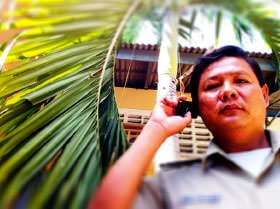
Pictured from top: Savoeun’s Uncle Ling, whose persistent phone calls paid off; Savoeun’s mother, now calm; Leuk Daek’s police chief, Saobun Chhoeun, who assisted in the rescue. Below: Savoeun, safe at last.
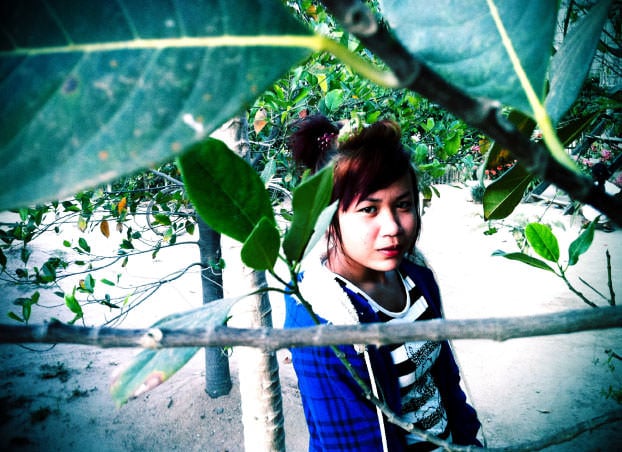
Home Again
In Leuk Daek, the community surrounded Savoeun. Youth leaders from World Vision’s children’s club came to visit. They’d held a vigil at Savoeun’s house during her disappearance, providing moral support to Savoeun’s family. Police guarded the family home, knowing Srey Pich had eluded law enforcement in Phnom Penh and could still be a threat. To date, she has not been apprehended. Ming Chan took Savoeun to the hospital where she was treated for what appeared to be drug-induced memory loss. Savoeun spent many days in hiding but eventually became well enough to work again.
“I want to keep her safe and sound,” says Savoeun’s mother. “I don’t want her to disappear. Every day I dream that my children will have good things in life.”
Savoeun, now 17, is working as a waitress with her cousin in a province in northeast Cambodia. But she hopes to come back home and join a youth club — something she never got to do because of her work at the factory.
“I know the clubs help children and adults as well. I would definitely like to be involved,” she says.
Savoeun is concerned for her younger sister, Srey Keo, who is 11. “I tell her to study hard. I tell her not to travel to a faraway place or she could be trafficked.
“I will protect my younger sister,” she says, from brokers like Srey Pich.
And the people of Leuk Daek are standing by to help.
Watch a video of Leuk Daek’s children using Savoeun’s story to teach others about the dangers of trafficking.

